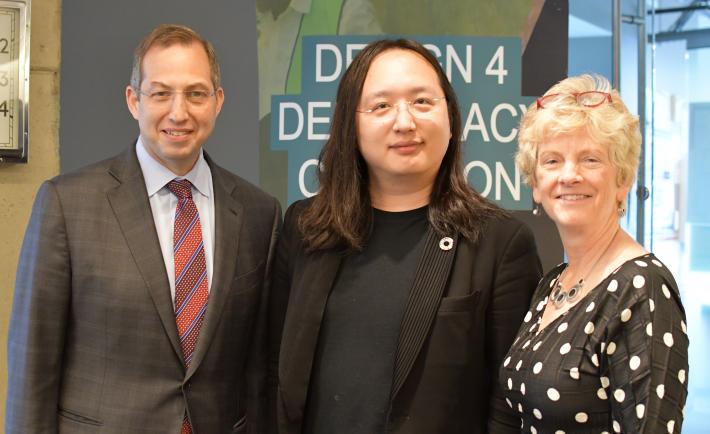
“Rethinking Democratic Government” at NDI, April 25th 2019, (left to right) NDI President Derek Mitchell, Tawain's "Digital Minister" Audrey Tang and NDI Boardmember Robin Carnahan.
For more than 35 years, NDI has worked to support democracy and human dignity in every corner of the globe. We currently work in 70 countries, and partner with thousands of courageous and committed individuals who are working to build a democratic future.
This month, in our DemWorks series, we are discussing the impact of China on democracy around the world. Today -- in contrast to China’s approach to technology as a method to stifle democracy -- technology in Taiwan is being used to improve people’s lives. Today we will interview Audrey Tang, Taiwan’s “Digital Minister.” Named one of Foreign Policy’s 100 Global Thinkers in 2019, Minister Tang is an innovator who is rethinking how government can create open, citizen-centered policies in Taiwan through what she calls “radical transparency.”
Audrey Tang: When I became the digital minister of Taiwan two and a half years ago, I wrote a prayer as my job description. When we see the ‘internet of things,’ let’s make it an ‘internet of beings.’ When we see virtual reality, let’s make it a shared reality. When we see machine learning, let’s make it collaborative learning. When we see user experience, let’s make it about human experience. And whenever we hear the singularity is near, let us always remember the plurality is here.
Derek Mitchell: Thank you for joining us, Audrey. Let me ask you: What do you mean by that term, ‘radical transparency?’
Audrey: Oftentimes when making policies, the visible parts above the ground are the ministers and the members of the parliament. However, most policymaking actually takes place at the root that is the career public service. By making sure that all the meetings that I chair with career public servants, with lobbyists from the private sector, with activists from the social sector are radically open, I make sure that everybody can review the transcripts of other people's positions when it comes to a common issue. That way, people will not get trapped in the silos of virtual realities, but rather will enter a shared reality where people discover potential synergies between their positions, and they can find common values.
Derek: In China, they use technology to stifle freedom and promote disinformation, including against Taiwan—and in Taiwan, you use technology to promote democracy and freedom. Can you explain the challenge coming from China, and what you and your colleagues are doing to counter it?
Audrey: In Taiwan, we're making the government transparent to the people, by trusting the people first with the open government data on procurement, on budgeting, on KPIs (key performance indicators) of government projects. Everything is up in an e-participation platform for people to comment and deliberate publicly. However, the PRC regime is making the citizens transparent to the state. Through facial recognition, through tracking systems like social credit, they are making sure that nobody can meaningfully organize horizontally in a way to affect political progress.
Derek: Thank you Audrey. It’s an honor for NDI to be your partner and we are inspired by your innovative approaches to harness the potential of technology for good.
Please share this DemWorks video with all of your friends and family. For more information on Democracy Heroes like Audrey, go to NDI.org and sign up for our monthly newsletter. Thank you for joining us.
